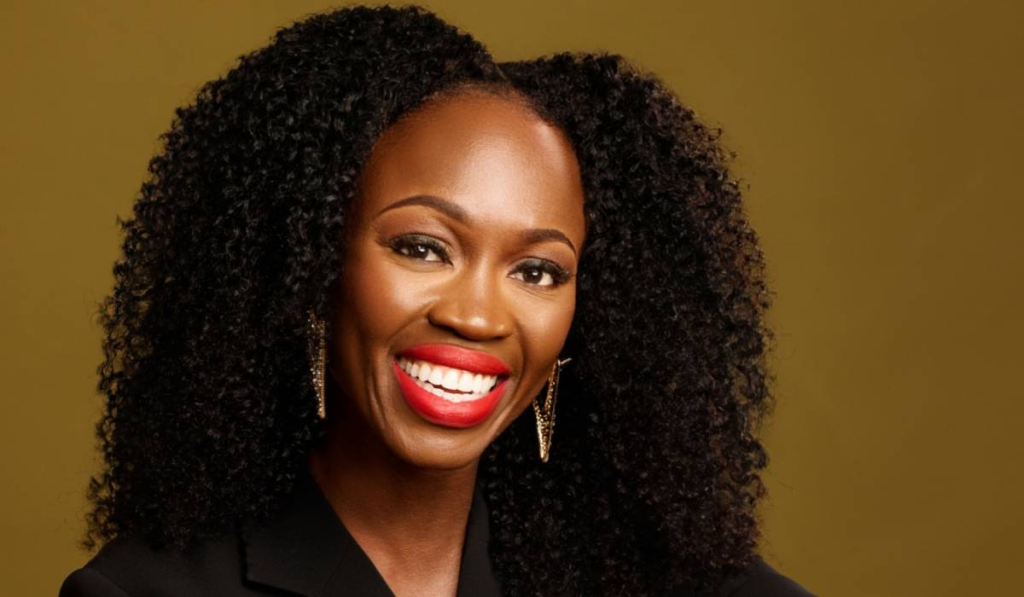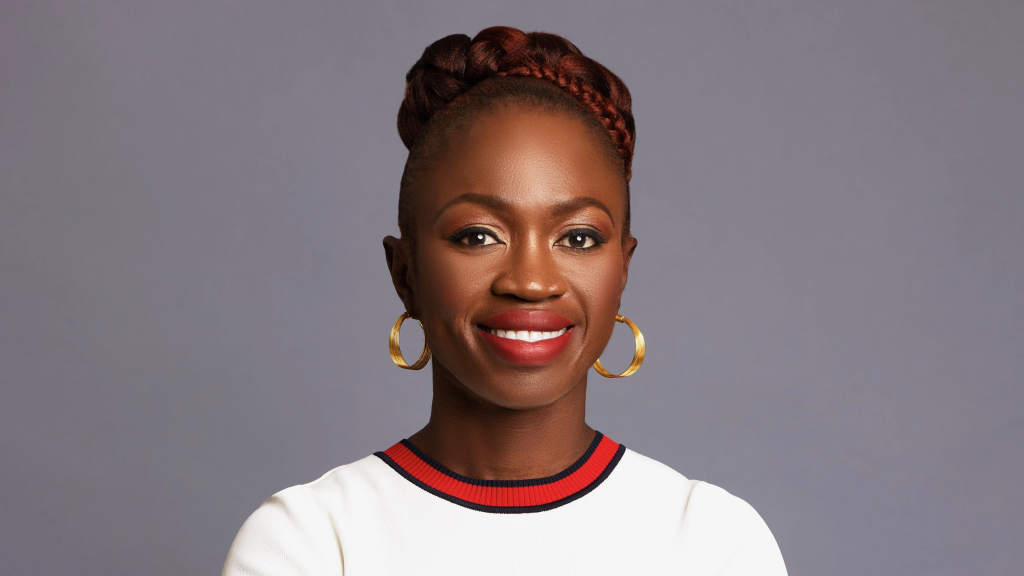In 1989, thirteen-year-old Adenah Bayoh, her grandmother Jenneh Viskinda and twenty other villagers fled through a dense Liberian jungle in the middle of the night. The images from that harrowing escape from armed rebels terrorizing their homeland, remain vivid in Bayoh’s memory decades later. She remembers: “I still have images of little kids being pulled to walk faster; mothers carrying kids on their backs with stuff on their heads.”
Today, that refugee child has transformed into New Jersey’s first Black female affordable housing developer, owns a $250 million real estate portfolio, operates multiple restaurant franchises and employs nearly 300 people.

Seeds of Entrepreneurship in Wartime
Before civil war erupted across Liberia, young Adenah Bayoh was already learning the fundamentals of business from her grandmother, a formidable entrepreneur who owned a restaurant, real estate, a farm, and a bakery. Every Saturday morning, Bayoh would follow Viskinda through the local marketplace, watching her interact with women from nearby villages and sell their goods. The child would carry bread baskets, cleverly lowering prices at day’s end to ensure sales. These were the earliest signs of the business acumen that would later make her a mogul.
When the First Liberian Civil War began in 1989, Bayoh’s world shattered. The family’s desperate flight to Sierra Leone became a defining moment. Perhaps most remarkably, when they reached the border and the wheelbarrow carrying her aging grandmother broke, the family was forced to leave Viskinda behind.
“When we left my grandmother, I was devastated. I was so sad. I remember counting marks and plotting my journey back,” Bayoh told Cuisine Noir. About two weeks later, in a display of rare courage that would characterize her entire life, the young girl returned to Liberia to retrieve her grandmother. “She was very shocked. From then on, she made sure she never left my side. She would always say, ‘Oh my God. You’re a dangerous little girl.'”
This act of bravery established a pattern. Adenah Bayoh continued crossing the dangerous border two or three times weekly, to her grandmother and others survive in the refugee camp by traveling back into war-torn territory to gather goods and vegetables for sale. “When we touched down, business resumed as usual. My grandmother was able to put a market together. My cousin and I would travel back into the dangerous parts of the country we just left to get goods and vegetables to sell at the refugee camp.”
American Dreams and Early Hustle
Even amid this chaos, Bayoh held onto a powerful vision of America. “I had this strong image of it and held onto it. I knew I was not destined to die in that civil war and that God had a greater plan for me.” When her parents, who had been in America earning money for their children’s education when war broke out, finally brought her and her brother to the United States at age 13, Bayoh was ready to work.
Despite being several grades behind and unable to read English, she threw herself into American life with characteristic determination. An English teacher met her before school every morning for tutoring, helping her graduate seventh in her high school class. But education was just one part of her hustle.
“When I got here, I was a busybody. I did everything. I started my first job at McDonald’s at 13 years old. I worked there all throughout high school,” Bayoh says. “When I went to college, I worked. I took 18 to 21 credits some semesters. But I always kept a job. I kept about two or three jobs.”
Building an Empire, One Property at a Time
This relentless work ethic paid off. While earning a business management degree from Fairleigh Dickinson University, Adenah Bayoh saved $27,000 from her multiple jobs. In 2001, at age 26, she made her first real estate investment: a three-family house in Irvington, New Jersey. She used her savings as a down payment and secured an FHA loan.
“When you grew up in Newark, Irvington was like the next thing that your family did. We call it getting out the hood,” Bayoh explains. She lived in one apartment and rented the other two and used the rental income to purchase four more houses. However, the 2008 financial crisis brought devastating setbacks, with multiple foreclosures threatening to destroy everything she’d built through subprime mortgages.
“I said to myself … this can either be the defining moment of my young life. This can either make me or break me. The choice is mine,” Bayoh reflects. “And what I did was I rolled up my sleeves, and I started fighting the banks.” Through court negotiations, she managed to save two properties, though her credit took a significant hit.
Adenah Bayoh’s IHOP Breakthrough
The foreclosure crisis led to an unexpected opportunity. During college, Adenah Bayoh and friends frequently visited their local IHOP for late-night hangouts. When she moved to Irvington, she was disappointed by the lack of quality casual dining options. “All we had at the time was two run-down diners, Popeye’s, McDonald’s, just go down the list of the fast food greatest hits. And I just didn’t think that was right.”
Learning of a rundown diner for sale, Bayoh decided to pursue it despite having no restaurant experience. Her encounter with the Greek owner became legendary. When she expressed interest in buying the property and put down $25,000, he increased the price from the expected $850,000-$900,000 to $1.2 million.
“When I gave him my $25,000, he jacked up the price to $1.2 million when it should have sold for $850,000 to $900,000. A lot of banks wouldn’t finance me. I think the reason for that was they hadn’t seen an Adenah before. They hadn’t seen someone like me that wanted to pull off what I wanted to do,” she explains.
Seven banks rejected her loan application before a business associate helped her secure financing through GE Capital Franchise Finance Corporation. In 2007, at age 27, Bayoh became one of IHOP’s youngest franchisees.
“I’ve always had the mentality of not thinking when is someone going to come in and do this, but when am I going to come and do it,” she says.

Expanding the Vision
Success bred more success. Naturally. Bayoh now owns four IHOP franchises, including one in downtown Newark that she rescued from closure, saving 50 jobs and adding 40 more employees. Her ventures have made her Irvington’s second-largest employer, according to the township.
But Bayoh’s vision extended beyond pancakes. In 2017, she partnered with Elzadie “Zadie” Smith to launch Cornbread Farm to Soul, a fast-casual restaurant serving farm-to-table Southern soul food. “Cornbread, for me, is a pact I’m making to have a greater impact in the restaurant space. If you look at the state of food right now, there is a national chain for every genre of food, but none around soul food,” says Bayoh.
The concept now has four locations with two more under development. In 2021, she added Brick City Vegan, a plant-based comfort food restaurant in downtown Newark, with a second location planned.
New Jersey’s Affordable Housing Pioneer
Perhaps most significantly, Adenah Bayoh has become New Jersey’s first Black woman to lead a major affordable housing development project. Her latest venture involves constructing a five-story, 40-unit building on Newark’s South Side that will provide affordable housing for low- and moderate-income families, with five units set aside for recently homeless families.
“But really building buildings that solve generational issues. That solve problems for communities that we talk about all of the time. I’m not interested in building anything that is not impactful,” Bayoh explains. Each unit will include free Wi-Fi, computers for families, and free on-site after-school tutoring through partnerships with organizations like the Newark YMCA.
Adenah Bayoh’s Legacy of Empowerment
Throughout her journey, Adenah Bayoh has remained committed to community empowerment and creating opportunities for others, particularly in underserved communities. “I think these communities where I am from suffer from disinvestment. Our communities are run down not because of us. They are rundown because we lack proper resources,” she says. “It is the tale of Black history in this country. For me, when I see us, I see opportunity. I see perseverance. I see strength.”
Her restaurants employ formerly incarcerated individuals and help shelter residents, while her business success creates pathways for other minority entrepreneurs. “When I opened my first IHOP, seven banks turned me down, but I didn’t give up. We need to have funding and capital readily available for minority women entrepreneurs.”
Today, with a $250 million real estate portfolio, multiple restaurant franchises, and nearly 300 employees across her ventures, Bayoh serves as a beacon of possibility. Named to Ebony Magazine’s Power 100 and NJBIZ’s Best 50 Women in Business, she continues expanding her brands while developing affordable housing projects.
“For me, escaping civil war gave me what is called grit. It sharpened my instincts. It made me navigate some really inhuman conditions. As you overcome obstacles and tear down barriers to survive, it gives you survival instincts,” Bayoh reflects.
Adenah Bayoh’s story resonates far beyond business success. It’s about a refugee child who refused to let circumstances define her destiny, transformed trauma into triumph and created opportunities for entire communities. As she puts it: “Here is a girl who came to the U.S. at age 13, couldn’t read, and fought her way through the education system to get a college degree… Here’s a girl who has fallen many, many times and has faced so many obstacles but refused to quit.”
Want to Join the Ranks of Immigrant Businesses Succeeding in the US?
You don’t need a million-dollar idea or a network of insiders to build a successful business as an immigrant in the US. You need a vision, a plan and the right guidance. Whether you’re an international student with a side hustle, a permanent resident looking to formalize a craft, or a newcomer dreaming of launching a food stall, we’ve got you covered. Our complete guide covers the following:
- How to choose a business structure
- How to register your business
- How to open a business account
- Everything related to taxes, permits and licences
- How to fund your businesses and
- Other relevant information pertaining to international students, residents and non-residents.
Get Started Here.












